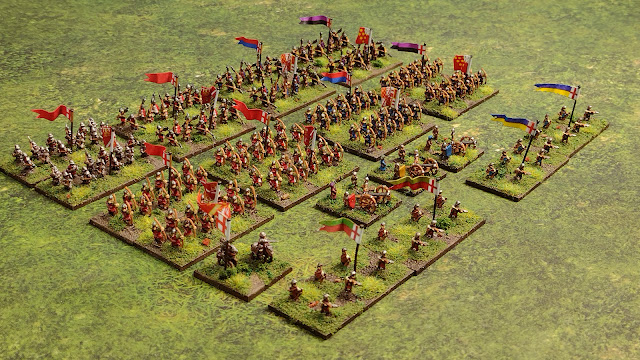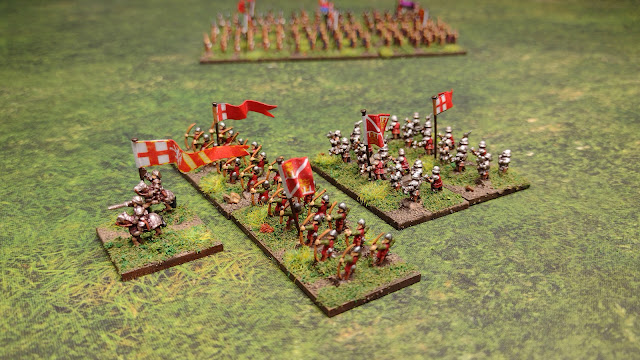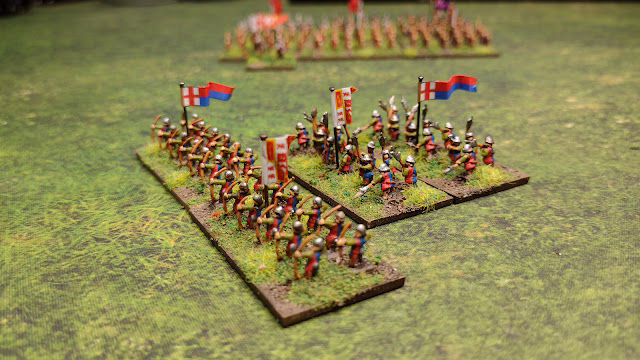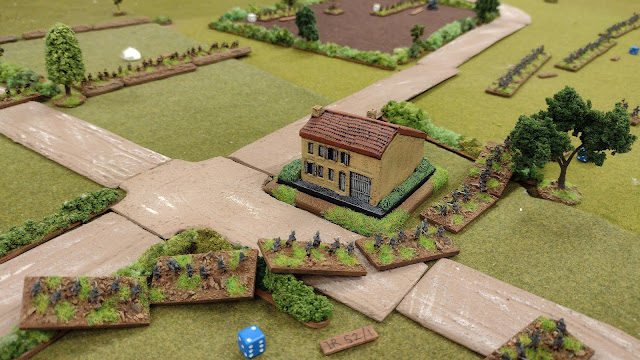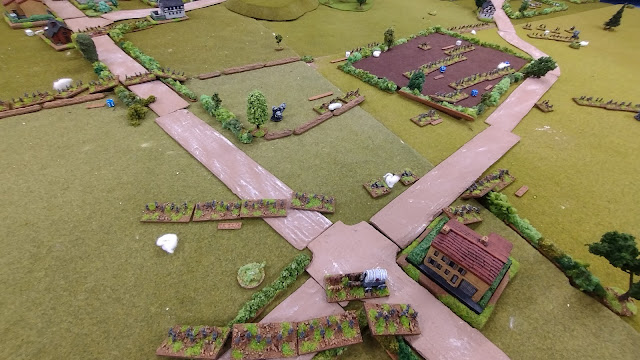Sunday 26 February 2023
Cavalier Show Report 2023
Hard times
Friday 24 February 2023
Norfolk's Battle at Bosworth
Sunday 19 February 2023
AI and Solo Wargaming
Thursday 16 February 2023
The Battle of Bavai August 1914
It has taken me a few days to bring myself to write this post. I've been too busy crying into my sauerkraut with the muffled cries of "das ist nicht fair" occasionally being heard. But I'm jumping ahead of myself, so let's start at the beginning of this sorry tale.
Over the weekend five members of Posties Rejects came together in the shed-o-war for a WWI game using Stuart's early war rules and his massive 6mm collection. Ray and Mark played a small British force tasked with holding back a numerically superior German offensive led by myself, Surjit, and Steve. Sides were determined as usual by picking from a metaphorical hat (bits of folded paper tossed on the table for us to scramble over!) and then the British players were taken out to see the battlefield and be introduced to their mission objectives. The German players sat and waited...and waited...and waited. We could only assume one of two things. Either they were crying into their warm beer over the situation they were handed by the umpire or were arguing between themselves about what to do. After the battle, we found that it was both, so potentially a good start for the German players.
Order of Battle (lifted from Ray's Blog post for this battle, Don't Throw a One)
British2nd Corps 5th Division BEF (C/O Ray, 2ic Mark)
13th Brigade
2/Kings Own Scottish Borderers
2/Duke of Wellington’s
1/Royal West Kent’s
2/Kings Own Yorkshire Light Infantry
14th Brigade
2/Suffollk
1/East Surrey
1/Duke of Cornwall’s LI
2/Manchester
9 Batteries of Field Artillery
2 Batteries of Heavy Artillery (off table)
5th Cavalry Brigade – attached
2nd Dragoons (Royal Scots Greys)
12th Lancers
20th Hussars
1 Battery of Horse Artillery
1 Ambulance
1 Field Hospital
Germans
1st Army 3rd Corps (C/O Lee, 2ic Surjit, 3ic Steve)
9th Brigade
8th Grenadiers (3 Battalions)
48th Infantry regt (3 Battalions)
10th Brigade
12th Grenadiers (3 Battalions)
52nd Infantry regt (3 Battalions)
11th Brigade
20th Infantry regt(3 Battalions)
35th Fusilier rget (3 Battalions)
12 Batteries of Field Artillery
Additional units attached
3rd Uhlans
3rd Jagers
1 Battery of Horse Artillery
Engineers and Pontoon Bridge
1 Ambulance
1 Field Hospital
The Action
 |
| The starting positons with virtually no British on the table and lots of German units primed and ready to attack. The Brits don't look very happy. |
 |
| My troops in the center were destined for some hard fighting. |
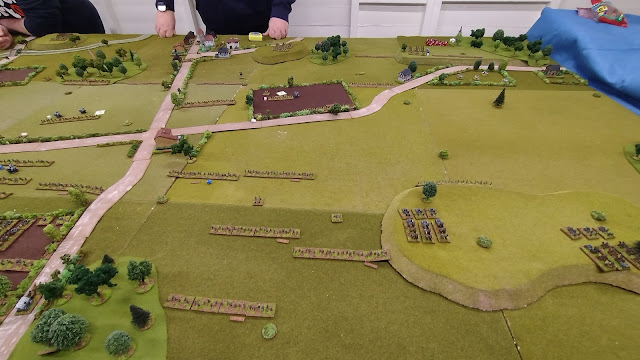 |
| On our right flank, Surjits Brigades move forward but some are pushed back by accurate artillery fire from the Brits. |
 |
| On the left flank, Steve's engineers are taking their time building a pontoon across the river, but the infantry Brigades under his command are sweeping forwards and keeping pace with mine. |
 |
| My Brigades push forward, largely foregoing a chance to fire their rifles in favor of the extra movement. But there were some strong points that needed to be overcome. |
 |
| But of course, that wasn't the case. Dismounted cavalry and a machine gun stood in their way. Steve weighed up the possibilities and decided his lance-wielding Uhlans would charge... |
 |
| Meanwhile, in the main town, a single British Brigade knows it cannot possibly hold its ground when the German offensive reaches it next turn. |
 |
| Over on the left flank, the Uhlans charge the dismounted cavalry and push them back easily. |
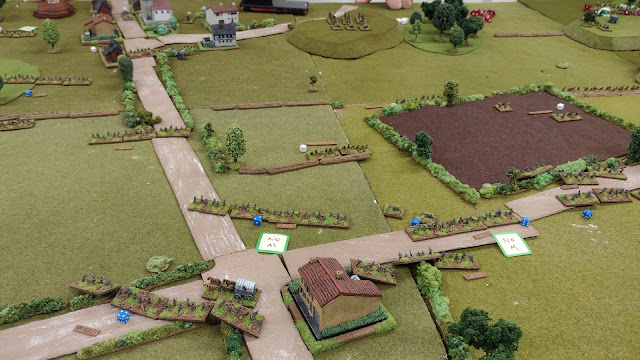 |
| The fight on our right flank grinds on, but British defeat here can only be one turn away. |
 |
| Moments before these two knew they had lost and had faces like slapped arses. Then Stuart announced. As you can tell, Ray was very happy with the result!! |
Analysis
Sunday 12 February 2023
Wargaming Modern Warfare: How soon is 'too soon'?
Tuesday 7 February 2023
The Battle of Montebello 1859
Gyulai’s uninspired offensive in Piedmont ground to a halt without ever contacting the enemy. Concerned that the French would attempt to turn his left flank Stadion’s V Corps was ordered across the Sesia River to move on Casteggio and Voghera. This was a reconnaissance-in-force and was determined to discover French dispositions, interdict the Voghera-Piacenza Road, and thwart these perceived threats.As the Austrians approached Casteggio, they ran into Sardinian cavalry screens positioned to prevent surprise attacks from the Austrians. The only means of crossing the River Coppa in this area are via two bridges: the bridge at Casteggio and the railroad bridge to the north of that town.Being heavily outnumbered, the Sardinians traded space for time as they slowly gave up ground to the approaching Austrians. Meanwhile, Forey’s division of the French 1st Corps quickly marched on Casteggio. By the time they arrived in the area, Stadion had already taken first Montebello and then Genestrello as the Sardinian cavalry retired.It is now 2pm and the Austrians occupy Genestrello, Montebello, and Casteggio with Schaafgotsche’s Brigade. Hesse’s right wing is marching upon Lungavilla from the north but all of Paumgarten’s Center Wing is East of the River Coppa. Reports suggest that the French are rapidly bringing Forey’s Division forward to contest the Austrian gains.
 I think Surjit knew he had to make one more attack now, while he still could. I had moved infantry, guns, and some hussars onto the high ground behind Montebello but I didn't really have anywhere to retreat to if they were thrown back. Surjit threw everything he could muster at my infantry south of Montebello. Thankfully I'd put an Artillery piece in that hex so that evened up the melee dice, and my leader added a moral bonus to the subsequent saving rolls. It was a draw, meaning the French, as the attackers, were thrown back, and the crisis was averted. I didn't know this at the time but that was pretty much it for Surjit's command. Maybe he could have mustered another assault, but by this point, fighting through first Steve's troops and now mine, he was pretty mauled.
I think Surjit knew he had to make one more attack now, while he still could. I had moved infantry, guns, and some hussars onto the high ground behind Montebello but I didn't really have anywhere to retreat to if they were thrown back. Surjit threw everything he could muster at my infantry south of Montebello. Thankfully I'd put an Artillery piece in that hex so that evened up the melee dice, and my leader added a moral bonus to the subsequent saving rolls. It was a draw, meaning the French, as the attackers, were thrown back, and the crisis was averted. I didn't know this at the time but that was pretty much it for Surjit's command. Maybe he could have mustered another assault, but by this point, fighting through first Steve's troops and now mine, he was pretty mauled. 